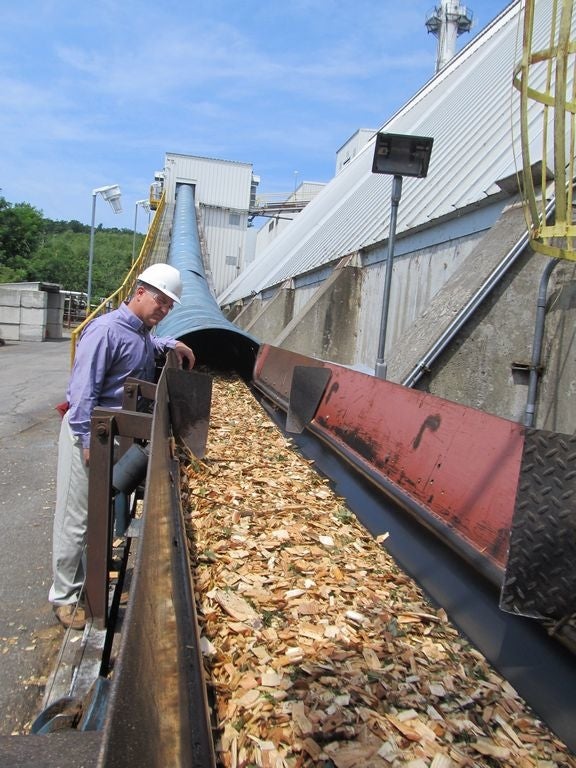With regulations ready to take effect that effectively close about 90 percent of the state’s land area to new wood-burning power generation facilities, Springfield-area lawmakers on Monday pushed for legislation that would more permanently eliminate state clean energy program subsidies for biomass anywhere in the Bay State.
Sens. Eric Lesser and Adam Gomez, and Rep. Orlando Ramos, each of whom represent parts of the western Mass. city known as the asthma capital of the United States, were joined by Boston Rep. Jay Livingstone in calling for the Joint Committee on Telecommunications, Utilities and Energy to issue favorable reports on bills (H 3333/S 2197) that would remove state incentives for facilities that burn wood products to generate power.
“The purpose of these two bills, and they are identical, is to remove woody biomass as an eligible fuel source in Massachusetts’ renewable energy portfolio standard, RPS, and the alternative energy portfolio standard, the APS standard,” Lesser, an opponent of a controversial wood-burning power plant proposed in East Springfield, said. “I want to be clear … H 3333 and S 2197 do not outright ban biomass. What they do is they eliminate the subsidy for biomass, and I feel strongly that Massachusetts ratepayers should not be subsidizing what is an inherently dirty fuel.”
The RPS governs the increasing amount of clean energy that utilities and municipal light plants must purchase each year. State law requires the Department of Energy Resources to make biomass facilities eligible for the RPS program and rules that have been in place since 2012 make only efficient combined-heat-and-power biomass plants eligible to sell renewable energy credits into the RPS market.
This spring, the Baker administration made changes to the state’s Renewable Portfolio Standard regulations to require that all new biomass plants meet an overall 60 percent efficiency requirement. The revised regulations would also prohibit biomass plants from qualifying for the RPS program if they are located within five miles of an environmental justice community.
Under the environmental justice policy in the new regulations, which are set to take effect this week, future biomass facilities could be located and be eligible for incentives in just 10 to 11 percent of the state — a stretch of communities west of the Connecticut River and along the Connecticut border, a strip of coastline that runs through Cohasset, Scituate and Marshfield, and small shreds of various other towns.
Sen. Michael Barrett, the co-chair of the TUE Committee, said the bills Livingstone and the Springfield lawmakers supported seemed like it “simply makes formal what the Baker people already conceded informally, which is that there is not to be any additional biomass built in Massachusetts.”
“If we’re going to create a map by administration regulation that bars biomass for 89 percent of the state, I think this is a de facto admission that biomass should no longer be part of a clean energy portfolio for Massachusetts,” Barrett said. He added, “All we’re being asked to do is to formalize something that has already become an informal rule. And in so formalizing this new policy against biomass, we would be protecting a handful of remaining towns that don’t qualify for environmental justice protection.”
Lesser pointed out the importance of the Legislature passing a bill related to biomass policy since the current landscape is shaped by regulations.
“As we all know, a regulation put in by an administration can be put in, it can be taken down, it can be changed,” he said. “A statute codifies it and says, ‘this type of pollution should not be subsidized under the state’s clean energy laws,’ and that’s what this bill would do.”
When the TUE Committee held a hearing on the Baker administration’s biomass regulations in July, DOER Commissioner Patrick Woodcock said that DOER wants to be “cautious with biomass energy” but defended the state’s two existing biomass facilities and suggested there could still be a place for them in the administration’s broader energy policy.
“We certainly do not think that it will be a significant contribution to Massachusetts’ overall portfolio,” the commissioner said. “I would note though, I’ve been working within the Baker administration since 2017. There are two facilities that are eligible for the standard — the Seaman Paper facility [in Gardner] and also the Cooley Dickinson facility [in Northampton] — and I haven’t heard any concern since 2017 with those facilities at all. Those are the types of facilities that are eligible and I would encourage the committee, as they’re thinking long-term about these policies, to visit those facilities.”

